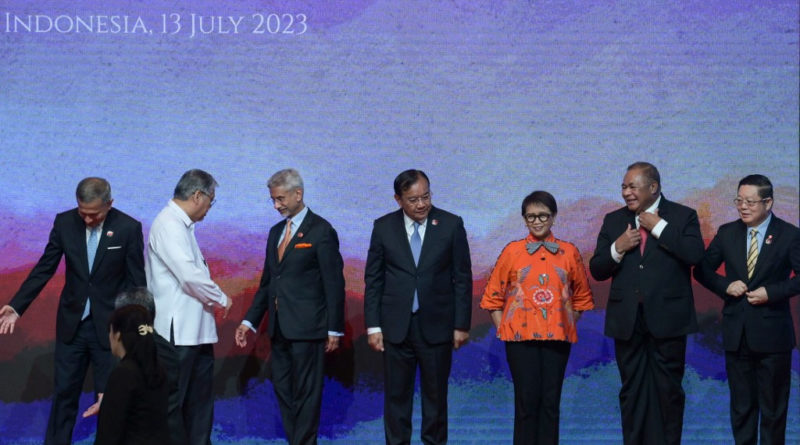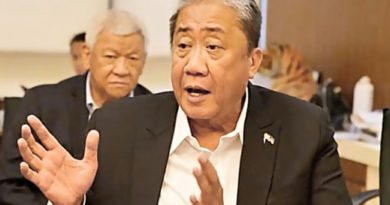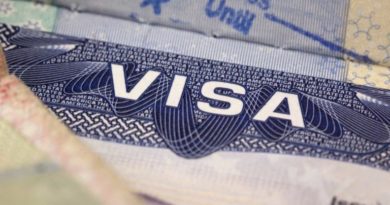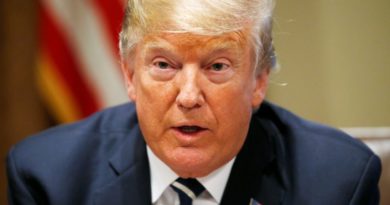OP ED | OPINION-EDITORIAL | ASEAN chairmanship matters
(From left to right) Singapore’s Foreign Minister Vivian Balakrishnan, Philippines’ Foreign Secretary Enrique Manalo, India’s Foreign Minister Subrahmanyam Jaishankar, Cambodia’s Foreign Minister Prak Sokhonn, Indonesia’s Foreign Minister Retno Marsudi, East Timor’s Foreign Minister Bendito Freitas and ASEAN Secretary General Kao Kim Hourn prepare for a family photo of the Association of Southeast Asian Nations (ASEAN) Post Ministerial Conference with India during the ASEAN Foreign Ministers’ meeting in Jakarta on July 13, 2023. (AFP/Bay Ismoyo)
.
 Editorial board
Editorial board
The Jakarta Post Jakarta
● Mon, July 17, 2023
.
.

Indonesia concluded one of ASEAN’s most important annual agendas in Jakarta last week, the ASEAN Foreign Ministers Meeting, in which the foreign ministers of the member countries meet and the host the growingly prestigious ASEAN Regional Forum (ARF).
But when asked about the benefits of the meetings to the public, Foreign Minister Retno Marsudi will probably find it difficult to answer because diplomatic activities do not always bring immediate impact to the public.
Many people across the region are not satisfied with the performance of ASEAN, which will commemorate its 56th anniversary on Aug. 8. The criticisms include the strict non-interference principle of members’ domestic affairs and an extreme lack of achievements despite many meetings of ministers and senior officials, which usually only produced documents containing rhetorical statements.
Many of the criticisms lamenting ASEAN’s slow progress are valid and therefore deserve immediate responses, but we need to acknowledge that the role and influence of ASEAN are rapidly growing globally.
The ASEAN Foreign Ministers meeting last week issued a 149-point joint communique which conveys key messages crucial for the development, security and livelihood of the population in the region. Laypeople, however, will find it difficult to understand, especially if they read it at a glance.
On the last day of the gathering, ASEAN hosted the 30th annual ARF. Their guests included foreign ministers from the United States, China, Japan, South Korea, the European Union, India, Pakistan, Australia, New Zealand, Canada and Russia.
The presence of the ASEAN dialogue partners reflected their enthusiasm to work with the regional bloc. In fact, more and more countries intend to build partnerships with ASEAN.
High level government leaders and dialogue partners always attend the second part of the biannual summit of ASEAN leaders in September. US President Joe Biden, Chinese President Xi Jinping or Premier Li Qiang and Japanese Prime Minister Fumio Kishida were among the prominent world leaders who felt obliged to meet their ASEAN counterparts in the last few summits.
The ARF has become the most important forum in the Asia Pacific to discuss global security issues, such as Russia’s invasion of Ukraine, China’s claim of sovereignty over nearly the whole South China Sea and the increasing tension in the Indo-Pacific region.
The ARF is not meant to produce solutions as it is not a negotiation-based forum, but it can at least play a role as a confidence-building measure. ASEAN foreign ministers have emphasized the ARF’s role in promoting dialogue and cooperation among participants in the past 30 years, as a key platform for building mutual trust and confidence and as a place to consult each other on regional political and security issues.
“We look forward to continuing to work together towards revitalizing the ARF so that it continues to function as the leading regional security forum in the Asia-Pacific region and further promote concrete cooperation and consultation to address political and security issues of common interest and concern,” ASEAN foreign ministers concluded after last week’s meeting.
The foreign ministers have done their part in diplomacy and have suggested improving international relations with non-member countries, including anticipating rising rivalry and conflict among major countries such as the US and China. ASEAN is directly affected by the superpower rivalry, and it should be careful in taking a balanced position. The ASEAN meetings are crucial in putting the regional grouping in the right place.
The results of the ASEAN Foreign Ministers’ meeting last week will be considered by ASEAN leaders when considering recommendations to propose at the summit in Jakarta in September. The leaders should also accommodate public input in order to prove the bloc’s relevance to the people.
As current ASEAN chair, Indonesia must fulfill its promise to make ASEAN more relevant and more beneficial to the public before it passes the baton to Laos in five months.
.


 Memento Maxima Digital Marketing
Memento Maxima Digital Marketing
 Memento Maxima Digital Marketing
Memento Maxima Digital Marketing






